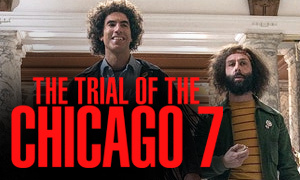Sergio: History vs. Hollywood
| REEL FACE: | REAL FACE: |
Wagner Moura
Born: June 27, 1976 Birthplace: Rodelas, Bahia, Brazil | Sergio Vieira de Mello
Born: March 15, 1948 Birthplace: Rio de Janeiro, Brazil Death: August 19, 2003, Baghdad, Iraq (Canal Hotel bombing) |
Ana de Armas
Born: April 30, 1988 Birthplace: Havana, Cuba | Carolina Larriera
Born: abt 1972 Birthplace: Bahía Blanca, Argentina |
Brían F. O'Byrne
Born: May 16, 1967 Birthplace: Mullagh, County Cavan, Ireland | Gil Loescher
Born: March 7, 1945 |
Garret Dillahunt
Born: November 24, 1964 Birthplace: Castro Valley, California, USA | U.S. Army Sergeant William von Zehle
|
Bradley Whitford
Born: October 10, 1959 Birthplace: Madison, Wisconsin, USA | Paul Bremer
Born: September 30, 1941 Birthplace: Hartford, Connecticut, USA |
Was Netflix's Sergio based on the 2009 HBO documentary of the same name?
While researching the Sergio true story, we discovered that, to a large degree, the Netflix film was inspired by the 2009 HBO documentary Sergio. Both the Netflix movie and the Sergio documentary were directed by Greg Barker. The screenplay for the film was written by Craig Borten (Dallas Buyers Club). The movie was also inspired by the book Chasing the Flame by Samantha Power.
What's the most accurate part of the Sergio Netflix movie?
While most of the film sticks pretty close to reality, the scene that begins the film is likely the most accurate. We see U.N. diplomat Sergio Vieira de Mello (Wagner Moura) sitting behind an office desk recording a video message to welcome and inspire new recruits to the organization. You can watch the actual video of the real Sergio Vieira de Mello delivering the same exact message. At the time, de Mello was working as the U.N. High Commissioner for Human Rights. de Mello closes out the piece by emphasizing the importance of work in the field. The scene is used to set up a series of flashbacks and flash-forwards that highlight de Mello's own time doing field work in Cambodia, East Timor, Indonesia and, lastly, Iraq. However, this scene isn't the only time that the film quotes the real de Mello nearly word for word.
Did Sergio Vieira de Mello meet girlfriend Carolina Larriera while brokering a piece deal in Indonesia?
Yes. While researching the Sergio fact vs. fiction, we discovered it's true that Argentinian U.N. economic adviser Carolina Larriera, portrayed by Ana de Armas, met the father-of-two when he was brokering a peace deal between the Indonesian government in East Timor and the rebels. The real-life Larriera was 29 at the time and the much older de Mello was approximately 53 with two grown sons. Their love affair resulted in de Mello deciding to end his marriage. However, it should be noted that while they had not been officially divorced, de Mello and his wife Annie had been separated for nearly two decades.
Carolina Larriera and Sergio Vieira de Mello had been living together in Paris for over three years. According to Larriera, they were engaged and planned to get married after leaving Baghdad. A Sergio fact check confirms that it's also true that Carolina Larriera was later recognized by Brazil as Sergio Vieira de Mello's "civil union spouse," a fact she emphasizes on her own official website.
Was Sergio Vieira de Mello's partner, Carolina Larriera, in the Canal Hotel at the time of the suicide bombing?
Yes. The Sergio true story confirms that the real Carolina Larriera was about to start typing a report at her computer in the Canal Hotel (the U.N. headquarters in Baghdad, Iraq) when a suicide bomber drove a large cement truck through a window three stories below her. The blast inflicted enormous damage to the hotel and left many of her fellow U.N. employees buried under concrete slabs or in agonizing pain after being pierced by pieces of broken glass.
Did Carolina Larriera really find Sergio and talk to him while he was trapped?
Yes. Like in the Sergio Netflix movie, she found him buried under carpeting, furniture, and beams. She tried to move several tons of concrete but to no avail. Carolina says that they exchanged words of love and comfort after he told her that he was in a lot of pain and could not get himself loose. Before long, she was forcibly pulled out from the rubble. She says that she tried to explain who he was and tell them where he was trapped, but there appeared to be no urgency to extract him. She was blocked from trying to go back inside. -Carolina Larriera Official Website
Did Serigo really lay in the rubble reflecting on his life?
This is perhaps the most fictionalized part of the Sergio Netflix movie. Director Greg Barker and screenwriter Craig Borten have attempted to imagine what was going through Sergio Vieira de Mello's mind as he lie dying in the rubble. They came up with a selection of memories and regrets that de Mello reflects upon. However, it is unclear what exactly was floating through the real Sergio Vieira de Mello's mind during those lonely and painful hours trapped in the shifting rubble, struggling not to lose consciousness.
We do know that in addition to talking briefly to fiancée Carolina Larriera, who found him in the rubble, de Mello also had an exchange with one of the men attempting to rescue him, U.S. Army Sergeant William von Zehle (portrayed by Garret Dillahunt). de Mello told Zehle, "Don't let them pull the U.N. out of Iraq. Don't let them fail this mission."
For a more accurate depiction of Sergio's true story than what is shown in the movie, read Samantha Power's Sergio Vieira de Mello book Chasing the Flame: One Man's Fight to Save the World.
For how long was Sergio Vieira de Mello trapped before he succumbed to his injuries?
Is is estimated that Sergio remained alive in the rubble for approximately three hours after the attack, eventually succumbing to his injuries. Workers gave him water as they tried to extricate him, but they were unable to save his life. His partner, Carolina Larriera, believes that not enough was done to save de Mello. To learn more about the real-life rescue efforts, check out the 2009 Sergio Documentary available via Amazon or HBO.
Did Gil Loescher survive the real-life attack?
Yes. In researching how accurate is Sergio on Netflix, we confirmed that Gil Loescher, who is portrayed by Brían F. O'Byrne in the movie, was severely injured but survived the attack. Loescher was Professor of International Relations at the University of Notre Dame and was also an expert on refugees. He had traveled to Baghdad to provide input on the human cost of war and reconstruction. The true story reveals that he was indeed trapped with U.N. Special Envoy Sergio Vieira de Mello, who did not make it out alive. Loescher lost both his legs and suffered other terrible wounds to his face and body.
How many people died in the Canal Hotel bombing?
At least 22 people died in the Canal Hotel bombing on the afternoon of August 19, 2003 in Baghdad, Iraq, including the United Nations Special Representative in Iraq, Sergio Vieira de Mello, and 20 members of his staff. More than 100 others were injured. A suicide bomber used a truck bomb contained inside of a large cement mixer. Investigators believed that the bomb was constructed from old munitions from Iraq's pre-war arsenal, including a 500-pound aerial bomb.
Who was behind the bombing of the U.N. headquarters in Iraq?
A Sergio fact check verifies that terrorist leader Abu Musab al-Zarqawi ordered the August 19, 2003 suicide bombing of the Canal Hotel in Iraq, which was the headquarters for the United Nations in Iraq (it had been since the early 1990s). Zarqawi was later killed by a joint U.S. force on June 7, 2006 in a targeted bombing of a safe house where he was having a meeting in the village of Hibhib in northern Iraq.
Was the August 19, 2003 attack the only time the U.N. headquarters in Iraq had been targeted by a suicide bomber?
No. Just a month later on September 22, 2003, another suicide bomber detonated a car bomb outside the Canal Hotel in Baghdad, the location of the U.N. headquarters in Iraq. The blast killed an Iraqi policeman, the bomber, and injured 19 others, including U.N. employees.
Sergio Vieira de Mello Interviews & Related Videos
Expand your knowledge of the real story behind Sergio on Netflix by watching video of the top U.N. diplomat below.
Link-to-Learn More:







